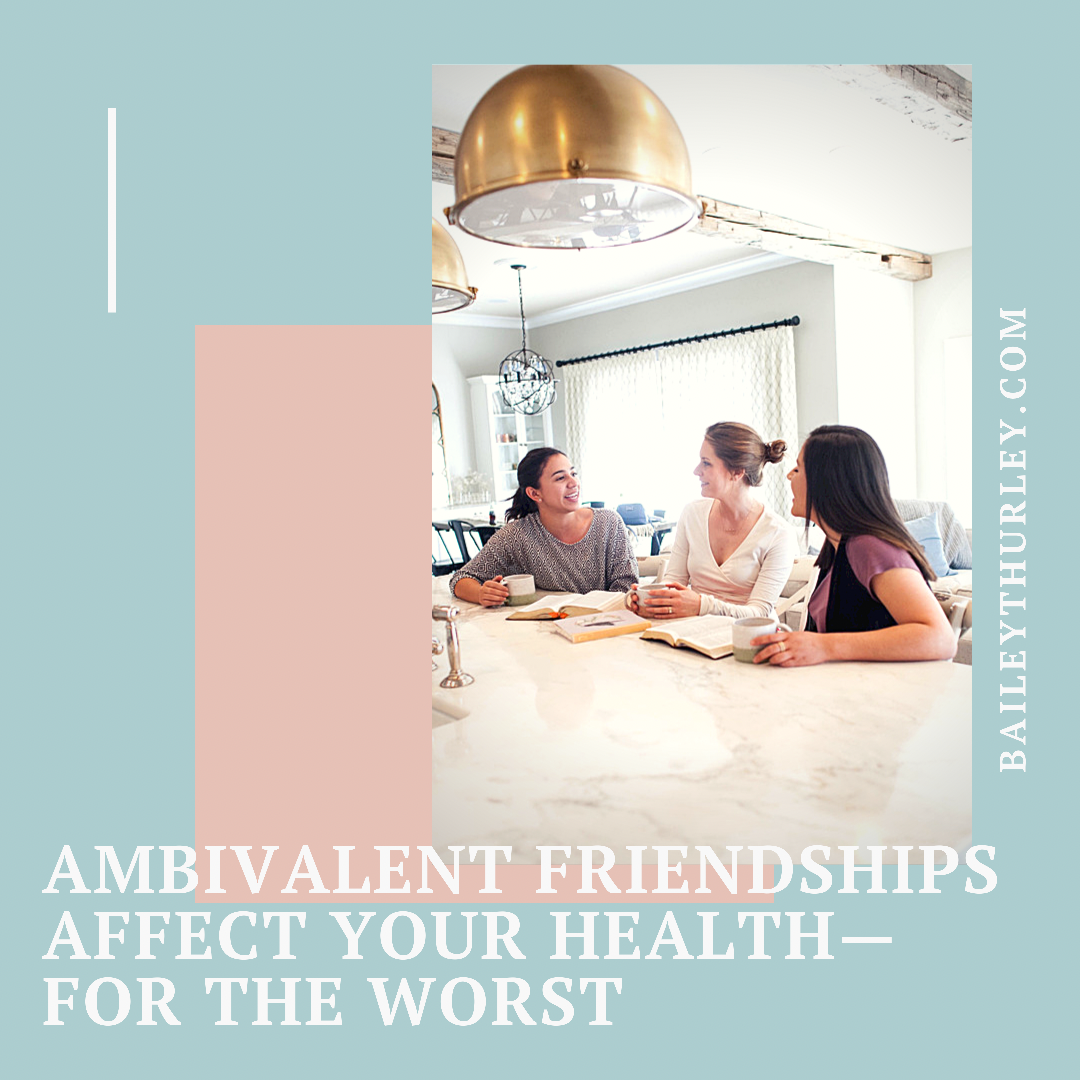It had been six months since our last coffee date, and I felt a little strange texting her, but I did it anyway. We had history so, isn’t that enough of a foundation to spend time together?
Me: Hey, it’s been so long. When can we grab coffee next before your workday?
Her: I can really do whenever.
Me: How about this Tuesday at 6am?
Her: I will get back to you…
Days went on. Then weeks. And now it has been exactly two months since we last texted. I tell myself her lack of response is fine. We are both busy. But there is also an unsettling worry over the situation. It brings up all the questions I have overplayed in my head before:
“Are we really friends?”
“Should I continue to make an effort?”
“Is it worth it for me to keep putting myself out there?”
In summary, I was stressing over the ambivalence of the friendship.
The unpredictability of ambivalent friendships impacts more than our mental/emotional health; it actually impacts our physical health too. In 2014, the University of Ohio (Bert Uchino, social psychologist) performed a study on adults and the common cold. Those adults with zero positive relationships (a.k.a. lived and worked alone) were more likely to catch a cold unlike those adults who had multiple positive relationships. Why? Because of the stress these ambivalent relationships have on the body increases our chance for a variety of health issues (high blood pressure, higher levels of inflammation, risks of increased aging…just to name a few) and decrease your chances of fighting off that nasty cold (Lydia Denworth, Friendship, 86).
It is our bodies sense of security in relationships that allows it to keep fighting.
So, is holding onto ambivalent friendships really good for us? Our bodies are created by God to flourish in friendships with women who promise “to be there for you.” We are called to invest in community, help one another, “bear one another’s burdens” (Gal. 6:2), and “live in harmony with one another” (Rom. 12:16). Your security in these relationships is enough to keep you going through the ups and downs of life.
I am now convinced: ambivalent friendships are a threat to security in our relationships.
SO, WHAT IS A SUPPORTIVE FRIEND?
Supportive friendship immediately made me thing of the paralytic man’s story in Mark 2 and the faith of his friends. The story takes place in a home in Capernaum where Jesus is teaching. The crowds are great and there was no more room to get into the home. But four friends had heard about Jesus’ power to heal. So they made an effort to bring their crippled friend to experience the touch of Jesus. When they can’t squeeze in, they climb onto the roof, remove it, and let down their friend on a bed to be healed.
The friends were carrying (literally) the burden of the crippled man. When he had probably given up all hope, his friends supported him all the way to the healing love of Jesus.
Ambivalent friendships are a threat to deep, spiritual ones. If we have friends that cannot support our journey towards God, it is time to let them go. These relationships will only hold us back from where God wants us to go—and the stress of this lack of support will lead us towards spiritual unhealth, physical unhealth and emotional unhealth.
I think back to my text conversation with my old friend and can see that I didn’t really know where it was heading or how much time to devote to growing it. I so badly wanted to hold on to this potential friendship. But, it may be better for us to clarify the direction of the friendship and potentially move on from friendships that will not go in the direction we want to go.
HOW DO WE AVOID AMBIVALENT FRIENDSHIPS?
We clarify them.
It is 100% your right to ask a friend, “Where is our friendship headed?” It seems confrontational, but it is actually freeing for both of you to express where your priorities are around the friendship.
A friend came over for a playdate–a relationship that had become hard to maintain. We didn’t have much in common anymore. But, I agreed to the playdate because I felt like I had to. While she was over, she just came right out and said, “I know you have been busy with your community, and I am busy with mine, so you are not obligated to be my friend.”
I was taken by surprise. I felt a bit offended but really, I was grateful she freed us both from a relationship we no longer prioritized. We were still friendly when we saw one another.
We learn to release them.
“When a halfway friend decides to part ways with you, let that person go! When you know he or she is not a covenant partner, when you know the season of relationship is over, then let the relationship come to a gracious and blessed end. You may want to acknowledge the positive aspects of your acquaintance and hopefully will want to wish the person well, but do not try to hold on. In addition, aoid thinking about how you can restructure your relationship; do not try to “make” anything work. Cling to your covenant partners, but kiss your halfway friends goodbye when the time for closure has come.” -Van Moody, The People Factor
We remind ourself this truth:
We are not capable of being everything to everybody. There are plenty of friends that are in your life for “just a season.” There is no shame in cutting ties with an ambivalent friend. A rejection is often God’s protection over you and your friend.






downsized (20 min away) it was like I was on planet “Nowhere near here”.
It got me thinking how much I did for them and the others on our block and how maybe it was out of my need that I offered to help or host all the gatherings. Maybe they were more ‘season of life’ friends than the spiritual sisterhood I had thought.
Ugh! This is so hard for me! I want to be friends with everyone but so often end up being the “ambivalent friend” because I am stretched too thin trying to make things work. I also feel so much of my time is family first in this season that it makes it harder to have a lot of active friendships. This is for sure convicting to me and something I will need to dig into and pray about! I don’t want to be hurting others by my hard to schedule friendship!
have grace for yourself! The best thing you can do right now is communicate to your friends how much you care for them and be clear about the areas you’ve struggled. Clarity covers a lot of friendship missteps.
A rejection is often God’s protection over you and your friend.
This.. this is what I’m having to accept. That and realizing that my former group of close girlfriends turns out, I was “just” a neighbor. When we downsized (20 min away) it was like I was on planet “Nowhere near here”.
It got me thinking how much I did for them and the others on our block and how maybe it was out of my need that I offered to help or host all the gatherings. Maybe they were more season of life friends than the spiritual sisterhood I thought. – feeling sad
Proximity certainly plays a large part in friendship and when you do move or shift your schedule, it reveals if the friendship was really a friendship after all. It’s normal to feel sad but not every friend is meant to come with us all the way. It’s natural for old friendships to recede and new friendships to start throughout our entire lives. Don’t give up. Being a friend is risky–it means giving and serving without expecting anything in return. Being vulnerable and loving knowing they could use it to hurt you. But Jesus counted the cost and chose to befriend us even when we disappoint him. We can rely on Jesus to meet our needs so from a place of security we can take the risk needed to be a friend.
Yes, I can relate to this. Thank you for sharing truth and encouraging each and everyone of us to fight for friendship and to know when to end it peaceful. The Bible also says there is a time for every season, and friendship can be seasonal.
you got it Angela! Thank you for sharing!